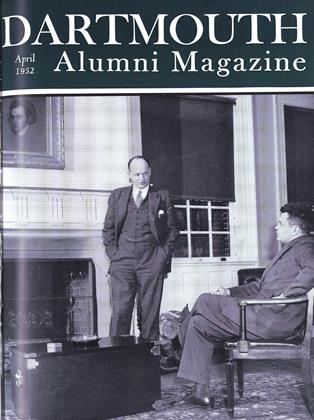MOST alumni and friends of Dartmouth College are acquainted with the contribution that the College is making to the training of potential officer personnel through the Army, Navy, and Air Force reserve units on the campus. Probably few know of the informal association that has developed in recent years between Dartmouth and the National War College, in Washington, the nation's top military educational institution. For the second year President Dickey is serving as a member of the Board of Consultants. In this capacity he spends several days each spring in residence at the War College with other members of the Board, reviewing the program and making recommendations for its improvement. President Dickey also has lectured at the college.
Professor John W. Masland, of Dartmouth's Department of Government, has divided his time in the past two years between Hanover and Washington, serving each year for a semester on the faculty of the military school. Next autumn he will be followed in this position by Professor John G. Gazley, of the Department of History. Professor Earl R. Sikes, of the Economics Department, spent a week at the College last September as a lecturer and instructor.
Presently Dartmouth is represented among the students at the College by Parker T. Hart '33, who is a member of the Foreign Service of the United States. Captain Charles O. Cook, USN, another student at the present time, was the executive officer of the Naval Reserve Unit at Dartmouth a few years ago.
The National War College was established in 1946 to provide training in the broader problems of foreign affairs, and to help meet the special needs of military and civilian administrators carrying immense burdens in this field. Its creation was a part of the program instituted following the war to facilitate team work among the separate military services and between them and other executive agencies of the government. The principal achievements of this program were the unification of the military services under a single Secretary of Defense and the Joint Chiefs of Staff, and the establishment of the National Security Council as a device for tight integration of the Department of State, the military services and other agencies in the formulation of national policies at the highest level. Responsible leaders also saw the need for -an educational program common to all services and departments to train the personnel required to administer unified, well-coordinated national policies.
The War College is a joint project, operated under the direct supervision of the Joint Chiefs of Staff, and the command responsibility is shared by the three services on a rotation basis. All services and the Department of State are represented on the staff and faculty. The student body is composed of approximately 90 officers of the Army, Navy and Air Force, at the rank of Colonel or Captain (USN), 20 Foreign Service officers or departmental officers of the Department of State, and 10 officers of other executive agencies, such as the Departments of the Treasury and Commerce, the Bureau of the Budget, and the Central Intelligence Agency. Selection is based upon past achievement and special qualities of leadership for high command and staff duty, or their equivalents in the nonmilitary agencies. These officers are much in demand to staff the various joint and inter-allied agencies.
The program of the War College, extending for ten months, is devoted to a systematic study of contemporary international affairs and to the national strategy employed by the United States in the accomplishment of its national aims and objectives. International affairs are the concern of the autumn semester and it is during this period that the school has drawn upon leading colleges and universities each year for five civilian instructors.
 View Full Issue
View Full Issue
More From This Issue
-
 Article
ArticleAlumni Fund Makes Strong Start in Its 1952 Campaign
April 1952 -
 Class Notes
Class Notes1929
April 1952 By F. WILLIAM ANDRES, EDWIN C. CHINLUND, GEORGE B. REDDING -
 Class Notes
Class Notes1918
April 1952 By ERNEST H. EARLEY, DONALD L. BARR, RICHARD A. HOLTON -
 Class Notes
Class Notes1917
April 1952 By KARL W. KOENIGER, DONALD BROOKS, HOWARD A. STOCK WELL -
 Class Notes
Class Notes1950
April 1952 By ENS. SCOTT C. OLIN, SIMON J. MORAND III, GLENN L. FITKIN JR. -
 Article
ArticleWe Bought a Hanover Farm
April 1952 By ELLEN DUKE
Article
-
 Article
ArticleProf. Wilson Given Oxford Award for Book on Diderot
February 1954 -
 Article
ArticleAlumni Articles
July 1962 -
 Article
ArticleFringe Benefits
March 1976 -
 Article
ArticleOff-campus institute seeks on-campus role
NOVEMBER 1986 -
 Article
ArticleHanover Browsing
June 1940 By HERBERT F. WEST '22 -
 Article
ArticleWebster Did Not Tear Up His Diploma
April 1931 By T. A. Merrill


